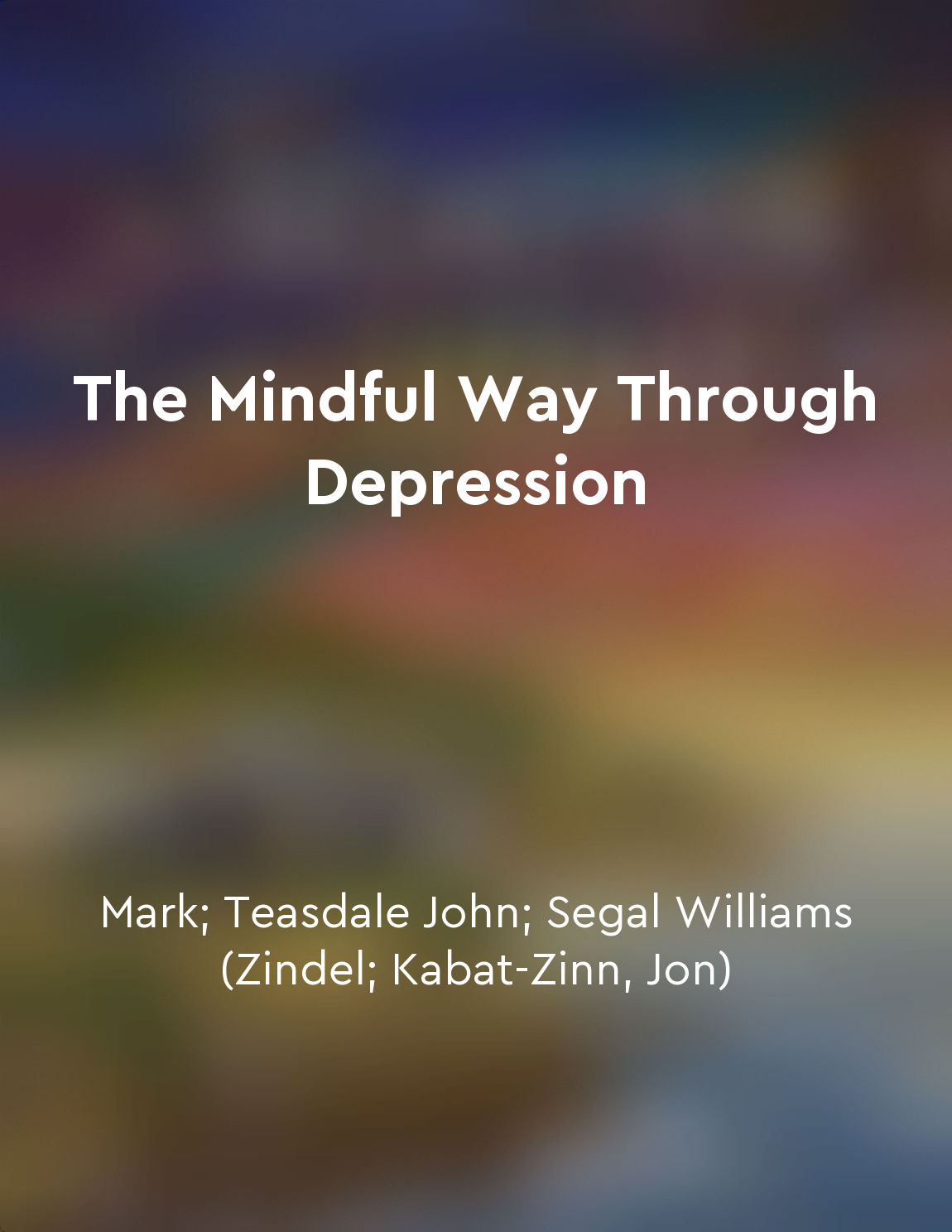Developing a nonjudgmental attitude towards ourselves is important in mindfulness from "summary" of The Mindful Way Through Depression by Mark; Teasdale John; Segal Williams (Zindel; Kabat-Zinn, Jon)
When we practice mindfulness, we are invited to observe our thoughts, feelings, and sensations without judgment. This means that instead of criticizing ourselves for having certain thoughts or feelings, we simply acknowledge them as they are. By developing a nonjudgmental attitude towards ourselves, we create the space to experience our inner world with curiosity and compassion. In the context of depression, this nonjudgmental attitude is crucial. Often, when we are struggling with depression, we are plagued by self-critical thoughts. We may blame ourselves for feeling a certain way or for not being able to "snap out of it." These judgments only serve to deepen our suffering and keep us stuck in a cycle of negativity. When we approach our experience with mindfulness, we can begin to break free from this cycle. By observing our thoughts and feelings without judgment, we can start to see them for what they are - temporary and ever-changing. We can learn to accept our experience in the present moment, no matter how difficult it may be. Through mindfulness, we can cultivate a sense of self-compassion. Instead of berating ourselves for our perceived shortcomings, we can offer ourselves kindness and understanding. We can recognize that we are human, and that it is natural to experience a range of emotions, including sadness and despair. This shift in attitude can be transformative. As we learn to treat ourselves with kindness and compassion, we begin to break down the barriers that keep us isolated and disconnected. We can start to build a deeper sense of connection with ourselves and with others.- Developing a nonjudgmental attitude towards ourselves in mindfulness is about creating a space for healing and growth. It is about learning to embrace ourselves with all our flaws and imperfections, and to recognize our inherent worth and dignity. By approaching ourselves with openness and acceptance, we can embark on a journey of self-discovery and self-compassion.
Similar Posts
Enhancing cognitive abilities through training
The idea of improving cognitive abilities through training is a central theme in the discussion of the intersection between Bud...
The book provides practical exercises and meditations for readers
Within these pages lie a wealth of practical exercises and meditations designed to guide you on a journey towards greater well-...
Collaborating with a therapist enhances treatment outcomes
When a client actively collaborates with their therapist during treatment, the chances of achieving positive outcomes significa...

It promotes a sense of calm and inner peace
The practice of mindfulness can lead to a profound sense of tranquility and harmony within oneself. By cultivating a present-mo...
Mindfulness at work is a valuable skill that can be developed and nurtured
Imagine being able to approach your work with a sense of calm and focus, no matter how hectic or stressful your day may be. Thi...
Mindfulness is a lifelong journey of selfdiscovery
Mindfulness is not something that you can just pick up and master overnight. It is a process that evolves over time, requiring ...
Negative thoughts can harm you
Negative thoughts have the power to harm you, both mentally and physically. When you dwell on negative thoughts, you are sendin...
Mindfulness training can help employees manage workplace stress effectively
In today's fast-paced and competitive work environment, stress has become a common issue for many employees. The pressure to me...
The role of spirituality and faith in coping with melancholy should not be overlooked
It is imperative to acknowledge the significance of spirituality and faith when dealing with melancholy. These elements can pro...
The effects of mindfulness practice are cumulative over time
The benefits of mindfulness practice may not be immediately apparent. It's not like taking a pill where you can expect instant ...


